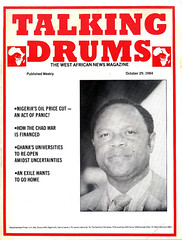Outlook 'on oil production'
"There are those who dispute the time-scale hoping rather than fore- casting that Nigeria's hard times might last for no more than 18 months, but almost everyone agrees that the Nigeria of the mid 80s will have to shed its former image of big-spending, fast growth and import-hungry economy," wrote Tony Hawkins in the Financial Times of January 23, 1984, after the coup which ousted Alhaji Shehu Shagari's government.
Arguing about an alternative solu- tion to borrowing from IMF as a necessary condition for encouraging international banks to resume medium and long-term lending, he noted that:
"There is an influential school of thought arguing that the optimal solution would be for Nigeria to secure an increased oil quota within Opec. If output were to be raised from 1.3m b/d at present to around 1.7m b/d this would give the country an extra US$4bn a year which would make all the difference in the world to its cash flow position.
Alas, this optimal solution looks out of reach especially with oil markets expected to weaken significantly in the second quarter of the year.
What is clear is that structural change is desperately important. This has been said again and again, but as long as the oil bonanza lasted, the Nigerians were seemingly content to take their time, promising much from their "Green Revolution" but seemingly achieving disappointingly little."
He continued:
"In 1979-80, crude petroleum accounted for some 22 percent of GDP falling to 13 percent last year and an estimated 11 per cent in 1983.
Indeed, agriculture's contribution to GDP is almost as large as that of oil while the distribution sector's share at 23 percent is substantially larger.
In the near-term, barring a major new interruption of Middle East oil supplies, Nigeria's oil export revenue is unlikely to increase very substantially above the current $10bn to $11bn levels.
It seems clear that the boom days of 1979-80 will not return and that, therefore, Nigeria must rapidly diversify out of oil-dependence.
Because oil provides 98 per cent of exports and well over 80 per cent of Government revenue, there is a very close cor- relation between oil ex- port receipts and economic performance. Oil at exports peaked $22.5bn in 1980 and are estimated to have more than halved to no more than $10.5bn in 1983.
In the last two years of the oil boom, Nigeria ran up a current account payments surplus of $4.5bn while its reserves exceeded $10bn in 1980. But in the last three years, the current account deficit has averaged more than $5bn annually, the foreign reserves have fallen to around the $1bn mark and real GDP has slumped 14 per cent from its 1980 peak."
